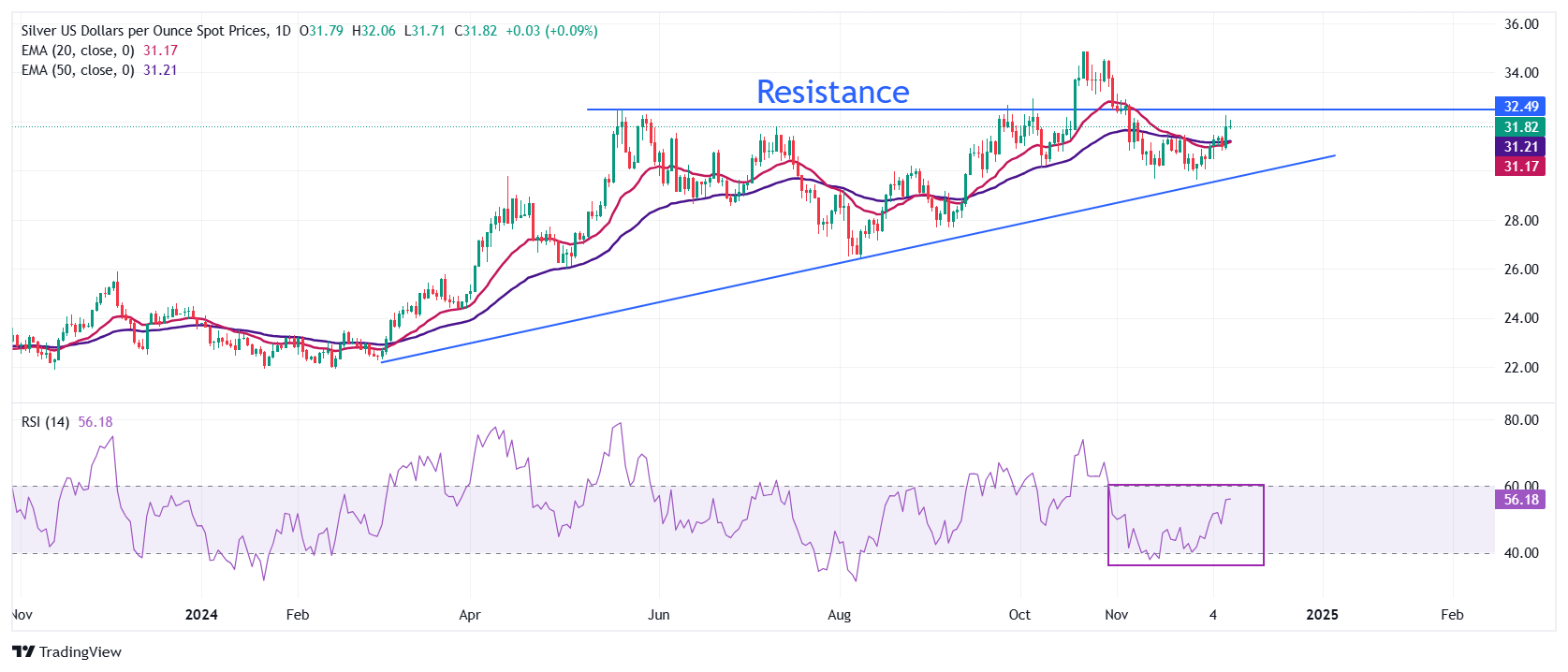Silver Price Forecast: XAG/USD consolidates near $32 ahead of China’s stimulus plans, US inflation
- Silver price trades sideways near $32.00 with a focus on a slew of global events.
- Investors expect the Fed to cut interest rates by 25 bps to 4.25%-4.50% on December 18.
- Tensions escalating in the Middle East would keep the Silver price well-supported.
Silver price (XAG/USD) trades in a tight range near $32.00 in Tuesday’s North American session. The white metal consolidates as investors await the outcome of China’s closed-door annual central economic conference to be held on Dec 11-12, according to Bloomberg, and the release of the United States (US) Consumer Price Index (CPI), which will be published on Wednesday.
Ahead of China’s conference, Politburo has already shown intentions of providing a strong stimulus to boost consumption and stabilize reality and stock markets. “Will implement more proactive fiscal policy and moderately loose monetary policy,” members of China’s Politburo said on Monday.
Meanwhile, the uncertainty ahead of the release of the US inflation data will also keep the Silver price on the sidelines. Economists expect the annual core CPI -which excludes volatile food and energy prices – to rise steadily by 3.3%. The annual headline CPI is estimated to have grown by 2.7%, faster than the former reading of 2.6%.
The inflation data will influence market expectations for the Federal Reserve (Fed) interest rate action in the policy meeting on December 18. There is an 86% chance that the Fed will reduce interest rates by 25 basis points (bps) to 4.25%-4.50%, according to the CME FedWatch tool.
On the geopolitical front, Israel’s attack on Syria to destroy its military infrastructure in an attempt to prevent Syrian rebels from attacking Israel in the future has escalated tension in the Middle East. Historically, heightened geopolitical tensions improve the safe-haven demand of the Silver price.
Silver technical analysis
Silver price trades inside Monday’s trading range around $32.00. The white metal rallied on Monday to near $32.30 after breaking above the three-day resistance of $31.30. The asset climbs above the 20- and 50-day Exponential Moving Averages (EMAs) near $31.15 and $31.20, respectively, suggesting a strong uptrend.
The 14-day Relative Strength Index (RSI) approaches 60.00. A bullish momentum would trigger a decisive break above the same.
Looking down, the upward-sloping trendline around $29.50, which is plotted from the February 29 low of $22.30 on a daily timeframe, would act as key support for the Silver price. On the upside, the horizontal resistance plotted from the May 21 high of $32.50 would be the barrier.
Silver daily chart

Silver FAQs
Silver is a precious metal highly traded among investors. It has been historically used as a store of value and a medium of exchange. Although less popular than Gold, traders may turn to Silver to diversify their investment portfolio, for its intrinsic value or as a potential hedge during high-inflation periods. Investors can buy physical Silver, in coins or in bars, or trade it through vehicles such as Exchange Traded Funds, which track its price on international markets.
Silver prices can move due to a wide range of factors. Geopolitical instability or fears of a deep recession can make Silver price escalate due to its safe-haven status, although to a lesser extent than Gold's. As a yieldless asset, Silver tends to rise with lower interest rates. Its moves also depend on how the US Dollar (USD) behaves as the asset is priced in dollars (XAG/USD). A strong Dollar tends to keep the price of Silver at bay, whereas a weaker Dollar is likely to propel prices up. Other factors such as investment demand, mining supply – Silver is much more abundant than Gold – and recycling rates can also affect prices.
Silver is widely used in industry, particularly in sectors such as electronics or solar energy, as it has one of the highest electric conductivity of all metals – more than Copper and Gold. A surge in demand can increase prices, while a decline tends to lower them. Dynamics in the US, Chinese and Indian economies can also contribute to price swings: for the US and particularly China, their big industrial sectors use Silver in various processes; in India, consumers’ demand for the precious metal for jewellery also plays a key role in setting prices.
Silver prices tend to follow Gold's moves. When Gold prices rise, Silver typically follows suit, as their status as safe-haven assets is similar. The Gold/Silver ratio, which shows the number of ounces of Silver needed to equal the value of one ounce of Gold, may help to determine the relative valuation between both metals. Some investors may consider a high ratio as an indicator that Silver is undervalued, or Gold is overvalued. On the contrary, a low ratio might suggest that Gold is undervalued relative to Silver.

